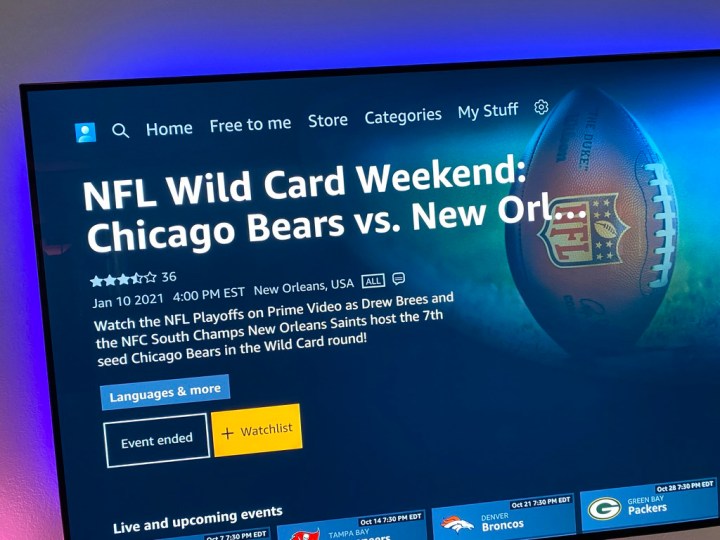If it seems like every major streaming service has been in the conversation to acquire the rights to distribute the highly desired NFL Sunday Ticket package, you’re right. Anonymous sources have been busy in 2021. Amazon has been in talks. So has Disney. Anyone with money, really.
The latest round has Apple, whose discussions leaked earlier in the summer, as the preferred suitor, according to yet more anonymous sources from The Athletic. And it goes on to say that “everything is on the table,” including a more à la carte plan that would allow you to only pay for the games you actually want to watch, something that’s been verboten in the television world since, well, forever.
The suitors are many, and they’ve got deep pockets. DirecTV has been paying something like $1.5 billion a year for the rights to Sunday Ticket, and that’s supposed to go up to $2 billion a year after the current deal expires at the end of the 2022-23 season.
It’s all up in the air at this point, like a badly thrown ball from Ben Roethlisberger that could either find its way into the end zone or wobbles like a wounded duck. But it’s also worth a little exploration of where the services and their parent companies stand today in the early weeks of the 2021 NFL season. Things undoubtedly will change, and it’s important to remember that the NFL earlier this year signed a wave of new contracts that take the television players through 2033. But that’s not counting Sunday Ticket, and it’s certainly nothing that the contract lawyers couldn’t work out.
So let’s throw some wild speculation around for a few hundred words.

Amazon
This one’s a real possibility. For one, Amazon already has the rights for Thursday Night Football, and has for a few years now. While that’s not exactly a marquee night for sports of any kind, it’s still an exclusive. And if there’s one thing sports leagues and tech companies (and the execs of both) love, it’s to be the first or only one to be doing something.
And Amazon also has another foothold into the league with its “Next Gen Stats,” which is “powered by AWS.” That’s shorthand for Amazon Web Services, which in a general sense means Amazon’s extremely powerful — and extremely profitable — cloud computing platform that basically powers a huge portion of the internet. The players have trackers built into their pads, and that gives all sorts data that gets fed back to the league, and to the viewers, during the game. Are those stats useful? Do we really care how far someone ran, or how fast they ran? Or what sort of percentage someone had to pull off some sort of play?
That last bit is, perhaps, a little much. Either a receiver catches the ball, or he doesn’t. Either a kick is good, or it’s not. Football is, as they say, a game of inches. Anything can happen. Amazon sponsoring some fuzzy math may make for better television in a sport that sees something like 20 minutes of actual action in a 3-hour broadcast. And that’s being generous.
Thursday Night Football and Next Gen Stats could actually work against Amazon getting the full selection of games in a Sunday Ticket-style deal. The NFL already has money coming in from Amazon, in addition to its other sources. Better to keep that revenue stream diversified. Unless, of course, we’re talking huge numbers in the new deal.
There’s also the question of platform. Amazon has millions and millions of impressions on its website and its apps, and it’s got the full force of Alexa behind it. But what it doesn’t have is its own dedicated pipeline into your pocket via a phone like Google does in
I’d consider Google to be a dark horse in this competition. It’s never really been in the conversation, though it certainly has the technology and the bank account to get it done if it wants to.
In Google’s favor is its streaming acumen, of course. It runs YouTube, which is the name you think of when you think of streaming video. It also has YouTube TV, which is at worst the third-largest live TV streaming service in the United States, and quite probably the second-largest. (If it had more than the 3.7 million subscribers Hulu With Live TV publicly boasts, the PR machine probably would have said something by now.)
Then there’s
Working against Google is the fact that it’s, well, Google. The company isn’t exactly known for having the greatest focus when it comes to something new and a little outside its normal lanes of operation. It’s also had a couple pretty public feuds this year already in the entertainment space, first with Roku, and now with NBCUniversal. If there’s anything the NFL doesn’t like, its dirty laundry being aired publicly.
Apple
If you had to pin me down and demand I predict which streaming platform will steer the NFL for the next decade or so, I’d say it’ll be Apple. There are a few reasons for that.
First, it’s the hardware. Putting NFL Sunday Ticket (or whatever else it might be called under a new deal) exclusively in the Apple camp would give the league a direct line to your iPhone and your iPad. It’d have access to your Apple ID email. It’d have access to the notifications on your devices. That’s a lot of marketing power.
It’d also give the NFL’s subscription service a pipeline onto your television via a number of methods. The Apple TV hardware is the obvious option, but Apple’s television play now expands far beyond Apple devices. Apple TV+ very quickly made its way onto other platforms, starting with Samsung smart TVs. And there are full Apple TV+ apps for
And then there’s the payment mechanism. If there’s one thing Apple’s gotten good at over the past 10 years or so, it’s making it super easy for you to fork over your money in the middle of some other experience. The idea of clicking your power button a couple times to watch the Bills play the Bucs (or whatever) and having it just work should be extremely enticing to the NFL suits.
On the other hand, there’s that pesky Apple tax.
Roku
Roku isn’t going to get an NFL streaming contract. At least not on its own. The simple fact is while it may play in the same sandbox as Amazon in terms of products like streaming sticks and advertising — it has the No. 1 streaming platform in the United States and No. 2 in the rest of the world — it simply doesn’t have anywhere near the same kind of cash flow as the likes of Amazon ($7.8 billion in the second fiscal quarter of 2021), Google ($17.9 billion in the second quarter), or Apple ($21.7 billion in its third quarter).
That’s not to say you should count out
But
Just never say never.
ABC/ESPN/Disney/Hulu
The Walt Disney Co. owns ABC and ESPN on traditional television, and
But think about the domestic product.
I wouldn’t rule Disney out of the equation, and Disney has been included in rumor stories, too. But this is also one of those situations in which everyone is always talking to everyone about everything.
The other broadcasters
We’re going to lump the likes of CBS, NBC, and Fox together for a few reasons. First is that all three already have existing deals to broadcast NFL games, and that’s not going to change anytime soon. CBS keeps the AFC. NBC has Sunday Night Football and a few Super Bowls. Fox keeps the
The streaming side of the equation is interesting, but perhaps not at the scale that would make things work for a Sunday Ticket-style deal.
CBS has Paramount+, which actually has been going fairly heavy on sports — particularly, the non-American style of football. NBC has Peacock, which is the butt of many streaming jokes but still exists in the abstract. And Fox has Tubi, which just launched a big “Sports on Tubi” push with a swatch of on-demand content from the NFL, Major League Baseball, NASCAR, and more. Tubi has some 33 million monthly active users. But what it doesn’t have, unlike Peacock and Paramount+, is a subscription service. Tubi is completely supported by advertising. It’s doubtful that the NFL would serve up out-of-market games for those kinds of peanuts.
Editors' Recommendations
- The 10 most popular streaming services, ranked by subscriber count
- NFL Sunday Ticket: Everything you need to know
- There’s only one streaming device that lets you escape ads
- NFL buffering on YouTube TV? You’re not alone today
- Everyone is missing the point on streaming video




